Charleston shooting: Obama's evolving language on race
- Published
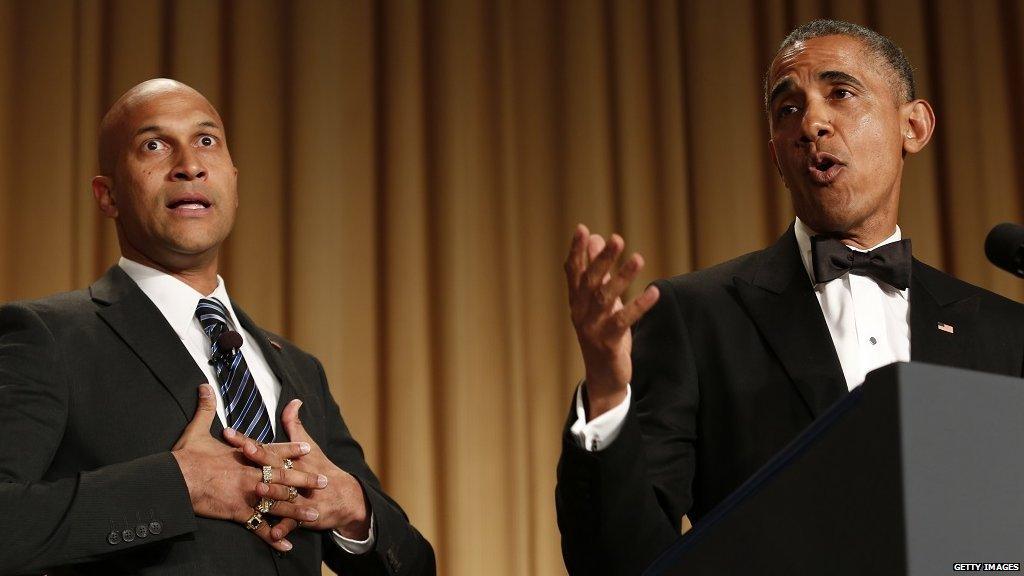
Does Obama still need an "anger translator"?
Barack Obama has tended to be reticent about race, and left others to attach racial meaning to his presidency.
His public comments on racist atrocities, like Charleston, and racial controversies, like Ferguson, have generally been measured and controlled, as if he is trying to keep a lid on his feelings.
The steady-state emotion that has been a hallmark of his presidency - his cool "no drama Obama" approach - extends also to America's racial dilemma. His gag at this year's White House correspondent's dinner was that he needed to outsource his demonstrative side to an "anger translator", played by the black comedian Keegan-Michael Key.
Key and comedy partner Jordan Peele had done the same comedy bit - a president who needs an angry proxy - since Obama's first term.
So his comments on a podcast about the legacy of slavery and segregation are noteworthy for their candour and bluntness.
But it is also the use of language that most Americans would go out of their way to avoid. "Racism, we are not cured of it. And it's not just a matter of it not being polite to say nigger in public," Obama commented in an interview for the podcast, WTF with Marc Maron.
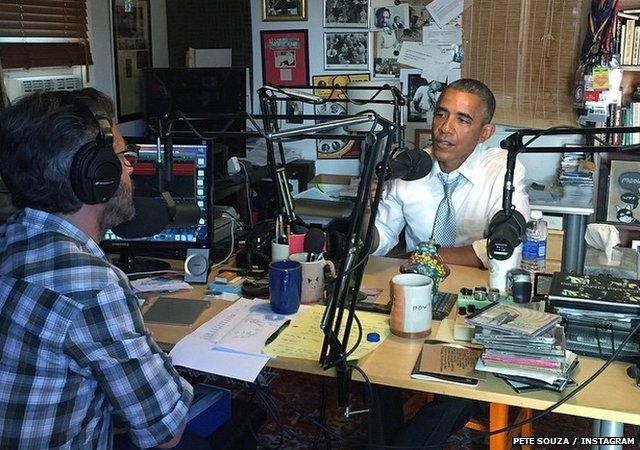
Mr Obama made the candid remarks during an interview with comedian Marc Maron
A president who weighs every sentence, sometimes in a ponderously professorial way, has used a provocative word that he knows will have an electrifying effect on the debate.
It shows that, as he approaches the end of his presidency, he's speaking not only with more frankness but also with more frustration, perhaps from his own inability to change things.
After all, the notion that his presidency would usher in a post-racial society - a hope articulated by others rather than Obama himself - now looks laughable.
Obama has never wanted his presidency to be defined by his skin colour. Determined not to be typecast, he has been at pains to avoid coming across as resentful or angry.
President Obama's comments on race over the years
David Remnick, the editor of the New Yorker, a biographer of the president and a journalist who has interviewed him at length, referred last week to a telling moment.
"After one interview in the Oval Office, [Obama] admitted to me that he was hesitant to answer some of my questions about race more fully or with less caution, for just as a stray word from him about, say, monetary policy could affect the financial markets, so, too, could a harsh or intemperate word about race affect the political temper of the country."
Throughout his presidency, speeches devoted solely to the question of race have been rare. So, too, comments in which he has brought his own experience of racism to bear.
His response in 2012 to the death of Trayvon Martin, the unarmed black teenager shot dead in by a neighbourhood watch coordinator George Zimmerman, was unusually candid and personal.
"If I had a son, he'd look like Trayvon," he said. But he did not elucidate the issue further.
As is often the case on matters concerning race, he delivered a fragmentary thought rather than the kind of rounded argument for which he is known.
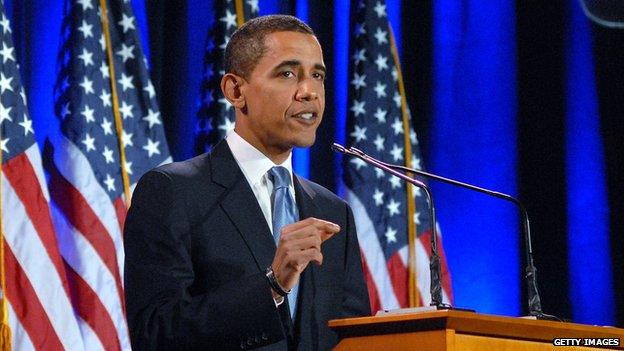
Mr Obama used a speech about race in March 2008 to call for moving beyond a racial divide
Even when Obama delivered his famed race speech in Philadelphia during the 2008 election, he emphasised his white heritage as much as his black - the fact that his mother came from Kansas as well as his father coming from Kenya. He seemed almost to be de-emphasising his blackness.
He adopted the same approach on the night that he accepted the Democratic presidential nomination in 2008, which, by a fluke of scheduling and quantum leap of history, coincided with the 45th anniversary of Martin Luther King's "I Have a Dream" speech.
That night he made only an oblique reference to "a preacher from Atlanta who told a people that 'We Shall Overcome.'"
In recent months, however, Obama has been noticeably less detached on the question of race.
In March, on the 50th anniversary in Selma, Alabama, he delivered his most complete speech on race to date, where he described one of the most climactic showdowns of the civil rights era as "not a clash of armies, but a clash of wills; a contest to determine the true meaning of America".
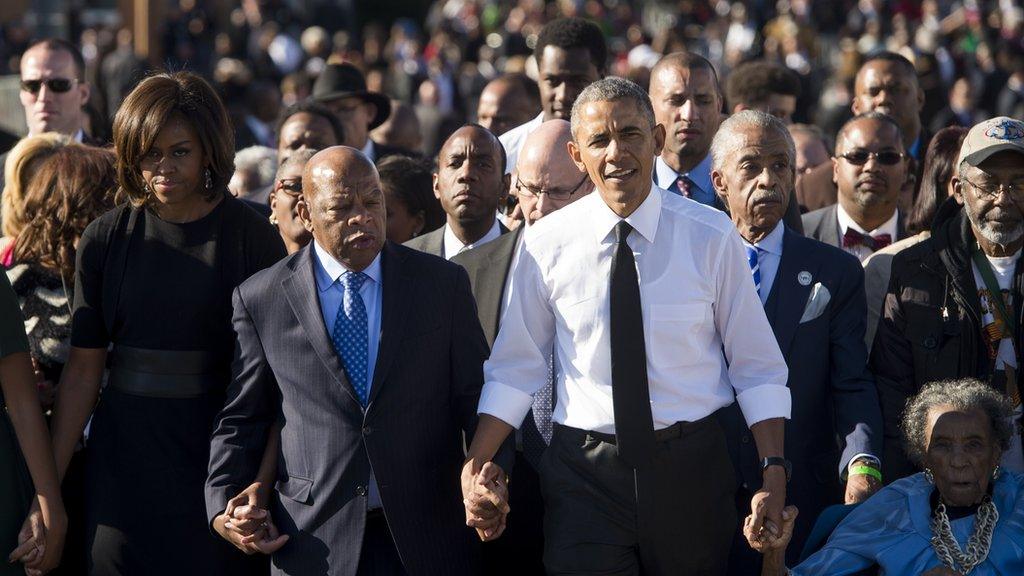
Obama walks in Selma on the 50th anniversary of Bloody Sunday
Coming in the aftermath of the racial disturbances in Ferguson, he also drew a line between the past and the present.
It was wrong to argue that nothing had changed in the fifty years since black protesters were so mercilessly beaten by the police, he said. But also observed that "a more common mistake is to suggest that Ferguson is an isolated incident; that racism is banished; that the work that drew men and women to Selma is now complete".
First Lady Michelle Obama also delivered an impassioned commencement address at Tuskegee University in Alabama, an institution long associated with the struggle for black equality.
Touching on Ferguson and Baltimore, and also the racial slights that she and her husband endured, she noted, "the road ahead is not going to be easy".
"It never is, especially for folks like you and me. Because while we've come so far, the truth is those age-old problems are stubborn, and they haven't fully gone away."
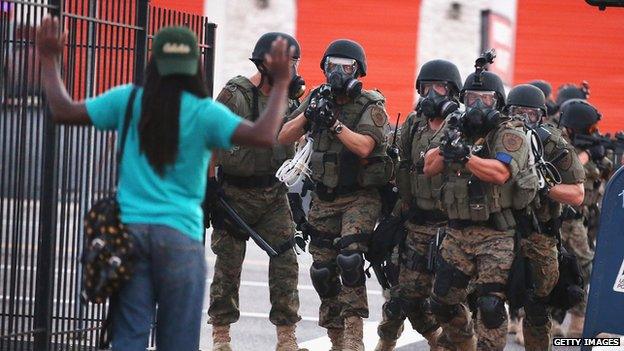
Some wondered whether she was playing the role of the president's anger translator, though there has also been the feeling that she identifies more closely with black history than her husband, because she is a descendant of slaves who grew up in Chicago, rather than Hawaii and Indonesia.
Though Obama is doubtless speaking with more passion, it could hardly be argued that he has cast caution aside.
His comments on the podcast, despite using such an explosive word, extend only a few sentences. In the aftermath of the Charleston shootings, when speaking from the White House, his strongest comments were reserved for gun control rather than race.
Noticeably, he has yet to deliver a nationwide address on race akin to John F Kennedy's famed televised address in June 1963 or Lyndon Johnson's remarkable speech before a joint session of Congress in the aftermath of Selma.
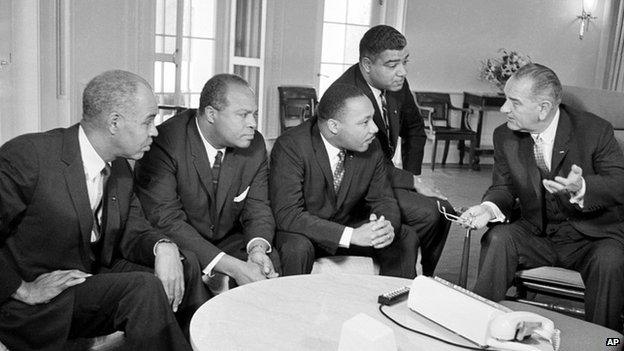
President Lyndon Johnson talks with Martin Luther King Jr and other civil rights leaders in 1964
His speech in Selma earlier in the year was one of the most eloquent of his presidency. But anniversary speeches, delivered with the safe distance of history, are very different from a primetime Oval Office address to the nation delivered in the immediate aftermath of an atrocity like Charleston.
When historians study the president's response, doubtless they will focus on his use of the "n-word". But they might also be struck that Obama did not seize upon the worst racial atrocity of his presidency to deliver a primetime nationwide address from the Oval Office.
More so than an interview conducted with a comedian in a garage, it would have entered the historical annals. And also risen to the historical moment.
Perhaps his eulogy at the funeral of the Reverend Clementa Pinckney on Friday will present the opportunity to deliver the kind of speech for which many Americans have waited more than six years. There he will occupy the presidential bully pulpit, in the most literal sense of all.